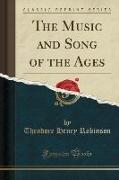- Start
- The Music and Song of the Ages (Classic Reprint)
The Music and Song of the Ages (Classic Reprint)
Angebote / Angebote:
Excerpt from The Music and Song of the Ages
At first, so difficult was it to abandon the Latin, we find a number of hymns, half Latin and half Germ-an. Congre gational singing was again revived. The ancient Ambro sian psalmody, in a purer and richer form, was given to the people. The choir of priests was dissolved. Instead of solo monotonous singing in uniform loud notes of equal value, a copious rythm with lively modulations was sub stituted, and about the close of the fifteenth century, sing ing in parts, took the place of singing in unison. The air was sung by the congregation, and the singers in the choir accompanied the congregation in the several parts. The air, however, was set in tenor, which was the leading part of music. The tunes were obtained by modifying old tunes, by appropriating national airs of the middle ages, and using, without reserve, the rich treasure of song-tunes in popular use. Many of the hymns were parodies of sec ular songs, the love songs of the minne-singers. Thus, the popular ditty, sung by wandering apprentices, which commenced: Inspruch, I must leave thee, and go my lonely way, far hence, to foreign lands, was transformed into 0 world, I must leave thee, and go my lonely way, unto my Father's Home. When Luther composed his melodies, the people were taught them by traveling musi eiaus, singing processions of school boys and city cornet teers. The Papal Church sought to prevent the singing. But, wherever the spirit of the Reformation went, there ¿owed the torrent of song. The demand for hymns and music was sudden, and the result of no visible design. It almost preceded the labors of the Reformers, and did more than preaching to inculcate religious truth. Europe, almost in an instant, was full of songs and singing, as if an epidemic had broken out. The rise of the phenome non in the Reformed Churches was remarkable. Clement Marot, a valet of the bed chamber of king Francis the first, and the favorite poet of France, tired of the vanities of the reigning poetry, and tinctured slightly with Pro testantism, applied to his friend Theodore Beza, for assist ance in rendering David's Psalms into French rhymes. This was in 1540. The amorous ditties of Marot had been the delight of the French Court. He dedicated his version of the Psalms to the ladies of France, and apolo gized for presenting such an offering to their taste. It seems with him to have been a mere freak of poetic license.
About the Publisher
Forgotten Books publishes hundreds of thousands of rare and classic books. Find more at www.forgottenbooks.com
This book is a reproduction of an important historical work. Forgotten Books uses state-of-the-art technology to digitally reconstruct the work, preserving the original format whilst repairing imperfections present in the aged copy. In rare cases, an imperfection in the original, such as a blemish or missing page, may be replicated in our edition. We do, however, repair the vast majority of imperfections successfully, any imperfections that remain are intentionally left to preserve the state of such historical works.
Folgt in ca. 5 Arbeitstagen
